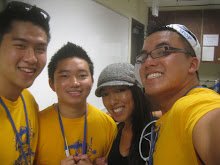Being a second generation Asian American living in California, there are a lot of identities that have to be negotiated day in and day out. However, there are two in particular: at home vs. being out.
At school I'm this outgoing guy who goes out of my way to meet people and shake hands. I'm involved in all these organizations and I go out, drink, party, go work out, everything.
At home I'm still my parent's child. Who's 22 years of age and yet I still address myself as "child" to them. Who's quiet at home and stays locked in his room. Every time I go home, I always make sure my ink isn't seen and I make sure to cover it up as well as possible. My parents know next to nothing about my life outside of the house.
When talking to the parents, it's so hard to relate things to how I see them, or at least, how my generation sees them. It's frustrating. It's frustrating with my horrible use of my native language - even more horrible that I read and write a foreign language better than the one I learned growing up. It's frustrating that I cannot relate my values, needs, and wants to them. It's frustrating not speaking to them like how my American friends do it.
What's the damndest thing of it all is when it's hard to explain it to my non-Asian friends. It's hard explaining about this sort of double life that I lead. That I'm sure most of us have been through.
I remember as a kid in grade school, I was disgusted when my friends didn't finish their lunches. I always finished mine! Why? Because my mom whooped my ass if I didn't eat EVERY SINGLE GRAIN OF RICE on the plate. Because you know, my wife will have pimples if I don't. Shoot, I still strive to eat everything on my plate.
We're a generation that's stuck in the middle, between the old country, and the new country. We have to negotiate culture and meanings from the first generation and fit it in with the country in which we live in now. We have to please our parents and we also have to please ourselves and our peers. We have to grow up as individuals in an individualistic society and at home we have to be switch back to being a part of a collective society.
We have to grow up quickly. At early ages many of us have already either worked for our parents, served as translators, and more of less have been given responsibilities not given to most American children. Given this new sense of responsibility we're also NOT given any freedom accustomed to those of traditional American culture. This creates a kind of cognitive dissonance. We go "Hey, how come my friends get to do that, but we don't?" Parents never can say, "It's because you're Asian, son."
It is, however, our job to create a sense of identity for ourselves. Some of us totally take in the old culture and reject the native country's culture. Some do the exact opposite. And then the vast majority of us are somehow in the middle. It is difficult, to be sure, to navigate this aspect of our lives since no one has yet developed what it means to be this, or to be that. We simply have examples. Examples of what our parents want us to be, examples of what America wants us to be.
I argue that it's neither of those things, it's what we as individuals strive to be. Taking motivation and goals from every each area and aspects of our lives. We have to live beyond expectations. That of our family's, our friends', and especially, ourselves.
Ladybug Korea
3 months ago



